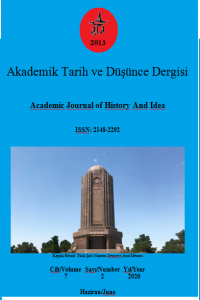İstihbarat Kurumlarının Askeri Darbelere Etkisi: Ajax Operasyonu Örneği
Ülkeler çıkarlarını kontrol etme konusunda titiz davranırlar. Petrol, Yirminci Yüzyılın üzerinde en titizlikle durulan konuları arasında gelmektedir. İstihbarat kurumlarının kullanılmasıyla ülke çıkarlarının geri kazanılması ise özellikle Soğuk Savaş Dönemi’nin vazgeçilmez bir yöntemidir. İran’da gerçekleşen Ajax Operasyonu bu konunun en önemli örneklerinden birisidir. Bu çalışmada; İstihbarat kurumlarının dış ülkelerdeki müdahaleleri sonucunda askeri darbelere nasıl etki ettikleri Ajax Operasyonu özelinde ele alınacaktır. Olayın daha net anlaşılabilmesi adına ilk olarak Ajax Operasyonuna giden süreçte Musaddık Dönemi ele alınacak ve darbeye giden süreçler anlatılacaktır. Sonraki bölümde Ajax Operasyonu’nun nasıl gerçekleştiğinden ve istihbarat kurumlarının etkilerinden bahsedilecektir.
Anahtar Kelimeler:
iran, muhammed musaddık, ajax operasyonu, istihbarat kurumları
The Effect of Intelligence Agencies on Military Coups: The Case of Ajax Operation
Countries are scrupulous about controlling their interests. Oil is one of the most meticulously focused topics of the twentieth century. The recovery of the country's interests through the use of intelligence institutions is an indispensable method, especially in the Cold War Period. Ajax Operation in Iran is one of the most important examples of this issue. In this study, the issue of how intelligence agencies affect military coups as a result of their intervention in foreign countries will be discussed in the context of Operation Ajax. In order to understand the incident more clearly, firstly the period leading to the Ajax Operation will be discussed and the processes leading to the coup will be explained. In the next section, how the Ajax Operation took place and the effects of intelligence agencies will be mentioned.
Keywords:
Iran, Mohammad Mosaddegh, Operation Ajax, Intelligence Agencies,
___
- BILL, J. A., ve LOUİS, W. R., Musaddiq, Iranian nationalism, and oil, University of Texas Press, Austin 1988.
- COTTAM, R. W., Iran and the United States: a cold war case study, University of Pittsburgh Press, Pittsburgh 1989.
- DANESHVAR, P., Revolution in Iran, Springer, New York 2016
- FOWLER, R., More Than a Doctrine: The Eisenhower Era in the Middle East, U of Nebraska Press, Nebraska 2018.
- GOODE, J. F., The United States and Iran: in the shadow of Musaddiq, Springer, New York 2016.
- KATOUZIAN, H., Musaddiq and the Struggle for Power in Iran, I.B. Tauris, New York 2009.
- ISRAELI, O., “The Circuitous Nature of Operation Ajax”, Middle Eastern Studies, C. 49, S. 2, London 2013, s. 246-262.
- JANIS, I. L., “Groupthink”, A First Look at Communication Theory, (Edit Em Griffin- Andrew Ledbetter- Glenn Sparks), McGraw-Hill Companies, New York 2008, s. 235-246.
- KIM, J., “The First American Secret War: Assessing the Origins and Consequences of Operation AJAX in Iran”, International Area Studies Review, C.9, S.1, Thousand Oaks 2006 s. 195-216.
- KINZER, S., Dulles Kardeşler: John Foster Dulles, Allen Dulles ve Gizli Dünya Savaşları, (çev. Arda Vardar), Profil Yayıncılık, İstanbul 2013.
- LEONHARDT, T. L., Desperate Measures: Truman, Eisenhower, and the Lead-up to Operation Ajax, Duke University Press, Durham 2015.
- MARSH, S., “HMG, AIOC and the Anglo‐Iranian oil crisis: In defence of Anglo‐Iranian”, Diplomacy and Statecraft, C.12, S.4, London 2001, s.143-174.
- MARSH, S., “The United States, Iran and Operation ‘Ajax’: Inverting Interpretative Orthodoxy”, Middle Eastern Studies, C.39, S.3, London 2003, s. 1-38.
- MCMURDO, T. L., “The United States, Britain, and the Hidden Justification of Operation TPAJAX”, Studies in Intelligence, C.56, S.2, Washington, D.C. 2012, s. 15-26.
- MILANI, A., Eminent Persians: The Men and Women Who Made Modern Iran, 1941-1979, Volumes One and Two, Syracuse University Press, New York 2008.
- MOKHTARI, F., “Iran's 1953 coup revisited: Internal dynamics versus external intrigue”, The Middle East Journal, C.62, S.3, Washington, D.C. 2008, s. 457-488.
- SKRINE, C., “New trends in Iran”, Journal of the Royal Central Asian Society, C.42, S.2, London 1955, s.100-115.
- PIROUZ, K., “Iran's Oil Nationalization: Musaddiq at the United Nations and His Negotiations with George McGhee” Comparative Studies of South Asia, Africa and the Middle East, C.21, S.1, Durham 2001, s. 110-117.
- RIEDEL, B., “Ricochet: When a Covert Operation Goes Bad” Studies in Intelligence, C.62, S.4, Washington, D.C. 2012, s. 15-20.
- RICHARD, Y., “Ayatollah Kashani: Precursor of the Islamic Republic?”, Religion and Politics in Iran: Shi'ism from Quietism to Revolution, (Edit Nikki Keddie), Yale University Press, New Haven 1983.
- ROOSEVELT, K., Countercoup, the Struggle for the Control of Iran, McGraw-Hill Companies, New York 1979.
- RUEHSEN, M. D. M., “Operation ‘Ajax’ Revisited: Iran, 1953”, Middle Eastern Studies, C.29, S.3, London 1993, s. 467-486.
- YOUNG, T. C., “Iran in continuing crisis” Foreign Affairs, C.40, S.2, New York 1962, s. 275-292.
- WILBER, D. N. Adventures in the Middle East: Excursions and Incursions, Darwin Press, Westerham 1986.
- https://www.bbc.com/turkce/haberler/2013/08/130820_iran_cia (08.06.2020).
- http://content.time.com/time/covers/0,16641,19520107,00.html (02.07.2020).
- https://nsarchive2.gwu.edu/NSAEBB/NSAEBB435/ (02.07.2020).
- https://www.theguardian.com/world/2013/aug/19/cia-admits-role-1953-iranian-coup (02.07.2020).
- https://archive.nytimes.com/www.nytimes.com/library/world/mideast/041600iran-coup-timeline.html?mcubz=3 (02.07.2020).
- Yayın Aralığı: Yılda 6 Sayı
- Başlangıç: 2013
- Yayıncı: Hakan YILMAZ
Sayıdaki Diğer Makaleler
İsmail COŞKUN, Dilara DEMİRTAŞ
Hitit Mektuplarında Kâtiplerin ve Görevlilerin Şahsi Yazışmaları
Birinci Umûmî Müfettişlik Bölgesinde Salgın Hastalıklarla Mücadele (1927-1952)
Selanik’te Görülen Salgın Hastalıklar ve Bu Hastalıklarla Mücadele Yöntemleri (1875-1913)
II Mahmud and His Statesmen’s Diplomatic Manoeuvres to Solve Mehmet Ali Pasha Crisis
بحثی در زیبایی شناسی زبان آثار عرفانی فارسی
Cevdet Bey ve Oğulları Romanında Kadın
